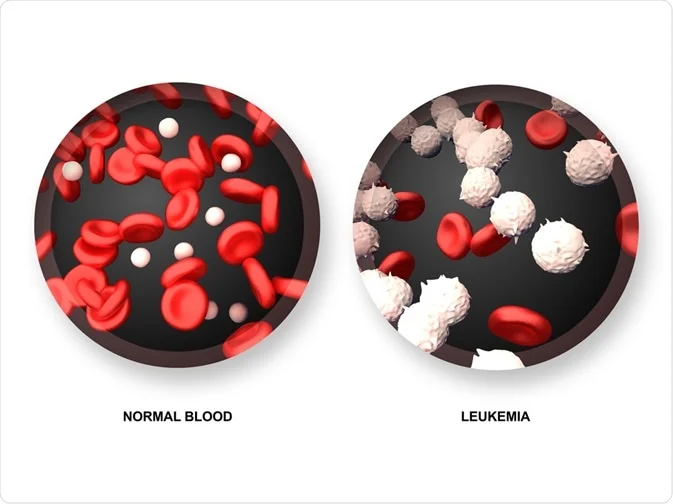Chronic Lymphocytic Leukemia (CLL) is a type of cancer that affects the blood and bone marrow. It is characterized by the accumulation of abnormal lymphocytes (a type of white blood cell) that do not mature properly and accumulate in the blood, bone marrow, and lymphatic tissues.

Causes:
The exact cause of CLL is unknown, but several factors may increase the risk:
- Genetic Factors: Family history of CLL or other blood cancers.
- Environmental Factors: Exposure to certain chemicals or radiation.
- Age: CLL is more common in older adults, typically affecting people over the age of 60.
- Gender: Men are more likely to develop CLL than women.
Symptoms:
CLL often progresses slowly, and some people may not experience symptoms for years. When symptoms do occur, they may include:
- Swollen Lymph Nodes: Painless swelling in the lymph nodes, usually in the neck, armpits, or groin.
- Fatigue: Persistent tiredness and weakness.
- Unexplained Weight Loss: Sudden loss of weight without obvious reason.
- Frequent Infections: Increased susceptibility to infections due to the compromised immune system.
- Anemia: Low red blood cell count, leading to symptoms such as shortness of breath and pale skin.
- Bruising or Bleeding: Easy bruising, frequent nosebleeds, or bleeding gums.
Diagnosis:
- Blood Tests: Complete blood count (CBC) and other tests to check for abnormal levels of white blood cells.
- Bone Marrow Biopsy: To examine the bone marrow for abnormal lymphocytes and assess the extent of the disease.
- Lymph Node Biopsy: If necessary, to analyze affected lymph nodes.
- Genetic Testing: To identify specific genetic mutations or markers associated with CLL.
Homoeopathy Treatment:
some homeopathic remedies that might be considered for managing symptoms associated with CLL:
- Arsenicum Album: Useful for managing symptoms of weakness, anxiety, and general exhaustion. It may also help with symptoms of nausea and digestive issues that can accompany chronic illnesses.
- Calcarea Phosphorica: Often used to support overall health and bone marrow function, particularly when there is general weakness and fatigue.
- Lycopodium: For fatigue, digestive disturbances, and a general feeling of weakness. It can also be useful for individuals experiencing digestive issues related to treatment.
- Phosphorus: For general weakness, bleeding tendencies, and symptoms of debility. It may help with managing fatigue and supporting the overall vitality of the patient.
- Rhus Toxicodendron: For managing joint pain and stiffness, which can be a concern for patients with chronic conditions.
- Silica: For supporting the body’s ability to recover and heal, especially if there is a need for strengthening and supporting the immune system.

